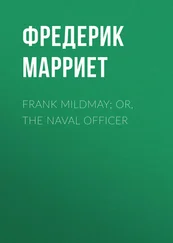Фредерик Марриет - The Mission
Здесь есть возможность читать онлайн «Фредерик Марриет - The Mission» — ознакомительный отрывок электронной книги совершенно бесплатно, а после прочтения отрывка купить полную версию. В некоторых случаях можно слушать аудио, скачать через торрент в формате fb2 и присутствует краткое содержание. Жанр: Детские приключения, literature_19, foreign_antique, foreign_prose, foreign_children, на английском языке. Описание произведения, (предисловие) а так же отзывы посетителей доступны на портале библиотеки ЛибКат.
- Название:The Mission
- Автор:
- Жанр:
- Год:неизвестен
- ISBN:нет данных
- Рейтинг книги:5 / 5. Голосов: 1
-
Избранное:Добавить в избранное
- Отзывы:
-
Ваша оценка:
- 100
- 1
- 2
- 3
- 4
- 5
The Mission: краткое содержание, описание и аннотация
Предлагаем к чтению аннотацию, описание, краткое содержание или предисловие (зависит от того, что написал сам автор книги «The Mission»). Если вы не нашли необходимую информацию о книге — напишите в комментариях, мы постараемся отыскать её.
The Mission — читать онлайн ознакомительный отрывок
Ниже представлен текст книги, разбитый по страницам. Система сохранения места последней прочитанной страницы, позволяет с удобством читать онлайн бесплатно книгу «The Mission», без необходимости каждый раз заново искать на чём Вы остановились. Поставьте закладку, и сможете в любой момент перейти на страницу, на которой закончили чтение.
Интервал:
Закладка:
"Why, my dear Alexander, on what expedition would you now proceed? Do you wish to visit the United States or South America?"
"No, sir; I wish to make a voyage of still more interest—I wish to go to Africa,—that is, to embark for the Cape of Good Hope, and from thence proceed to the northward, to ascertain, if possible, what now is a source of sad disquiet to you, the actual fate of those who were wrecked in the Grosvenor , and have not since been heard of with any degree of certainty."
Sir Charles was for a time silent. He pressed his hands to his forehead; at last he removed them, and said,—"I can not, much as I wish it, no,—I can not consent, my dear boy; the danger will be too great. You must not risk your life. It is very kind of you—very kind; but no, it must not be."
"Indeed, sir, I think, on reflection, you will alter your mind. As for danger—what danger can there be when missionaries are permitted to form their stations, and reside uninjured among the very savages who were so hostile when the Grosvenor was lost? The country, which was then a desert, is now inhabited by Europeans, within 200 miles of the very spot where the Grosvenor was wrecked. The continual emigration since the Cape has fallen under British government, and the zeal of those who have braved all dangers to make known the Word of God to the heathen and idolater, have in forty years made such an alteration, that I see no more danger in the mission which I propose than I do in a visit to Naples; and as for time, I have every reason to expect that I shall be back sooner than in the two years which you have proposed for my stay on the continent."
"But if some accident were to happen to you, I should never forgive myself for having given my consent, and the few days that are left to me would be rendered miserable."
"My dear sir, we are in the hands of God; and (short-sighted as we are) in running away from danger, as often run into it. What we call an accident, the fall of a brick or a stone, the upsetting of a vehicle, any thing trivial or seemingly improbable, may summon us away when we least expect it: 'In the midst of life we are in death,' and that death I may meet by staying in this country, which I might have avoided by going on this expedition. Difficulties may arise, and some danger there may be, I admit; but when prepared to encounter both, we are more safe than when, in fancied security, we are taken unawares. Do not, I entreat you, sir, refuse me this favor; I have considered well, and shall be most unhappy if I am not permitted to obtain the information for you which you have so much at heart. Let my travels be of some advantage to you as well as to myself. Do not refuse, I entreat you."
"You are a good boy, Alexander, and your kindness makes me still more unwilling to part with you. I hardly know what to say. Let us drop the subject for the present; we will talk of it to-morrow or next day. I must have time for reflection."
Alexander Wilmot did not fail to renew his entreaties on the following day, but could not gain Sir Charles's consent. He was not, however, discouraged. He had taken from the library all the works he could find relative to Southern Africa, and continually enforcing his arguments by quotations from various authors, all tending to prove that he might travel through the country without much risk, if he took proper precautions, his grand-uncle's objections grew daily more feeble, and at last Sir Charles gave his unwilling consent. In the meantime, the books which Alexander had read had produced a great effect upon him. When he first proposed the mission, it was more from a feeling of gratitude toward his old relative than any other, but now he was most anxious to go on his own account. The narratives of combats with wild beasts, the quantity and variety of game to be found, and the continual excitement which would be kept up, inflamed his imagination and his love of field sports, and he earnestly requested to be permitted to depart immediately, pointing out to Sir Charles that the sooner he went away, the sooner he would be back again. This last argument was not without its weight, and Alexander was allowed to make every preparation for his journey. Inquiries were made, and a passage secured on board of a free-trader, which was to touch at the Cape, and in six weeks from the time that the subject had been brought up, Alexander Wilmot took leave of his grand-uncle.
"May God bless you, sir, and keep you well till my return," said Alexander, pressing his hand.
"May the Lord protect you, my dear boy, and allow you to return and close my eyes," replied Sir Charles, with much emotion.
Before night Alexander Wilmot was in London, from thence he hastened down to Portsmouth to embark. The next day, the Surprise weighed anchor and ran through the Needles, and before the night closed in was well down the Channel, standing before the wind, with studding sails below and aloft.
CHAPTER III
A melancholy feeling clouded the features of Alexander Wilmot as, on the following morning, the vessel, under a heavy press of sail, was fast leaving the shores of his native country. He remained on the poop of the vessel with his eyes fixed upon the land, which every moment became more indistinct. His thoughts may easily be imagined. Shall I ever see that land again? Shall I ever return, or shall my bones remain in Africa, perhaps not even buried, but bleaching in the desert? And if I do return, shall I find my old relation still alive, or called away, loaded as he is with years, to the silent tomb? We are in the hands of a gracious God. His will be done.
Alexander turned away, as the land had at last become no longer visible, and found a young man of about his own age standing close to him, and apparently as much lost in reverie as he had been. As in turning round Alexander brushed against him, he thought it right to apologize for the unintentional act, and this occasioned a conversation.
"I believe, sir," said the other party, who was a tall, spare, slight-built man, with a dark complexion, "that we were both indulging in similar thoughts as we took leave of our native shores. Every Englishman does the same, and indeed every true lover of his country, let the country be what it will. We find the feeling as strong in the savage as in the enlightened; it is universal. Indeed, we may fairly say that it extends lower—down to the brute species, from their love of localities."
"Very true, sir," replied Alexander; "but with brutes, as you say, it is merely the love of locality; with men, I trust, the feeling is more generous and noble."
"So it ought to be, or else why are we so much more nobly endowed? This is not your first voyage, I presume?" continued the stranger.
"Indeed, it is," said Alexander; "I never was out of England, or on board of a vessel, before yesterday."
"I should have imagined otherwise," remarked his companion: "the other passengers are all suffering from sea-sickness, while you and I only are on the deck. I presumed, therefore, that you had been afloat before."
"I did feel very giddy yesterday evening," observed Alexander, "but this morning I have no unpleasant sensation whatever. I believe that some people do not suffer at sea."
"A very few; but it appears that you are one of those most fortunate, for by experience I know how painful and distressing the sickness is for some time. Breakfast will soon be ready; do you think that you can eat any?"
"Yes, a little—not much; a cup of tea or coffee," replied Alexander; "but I can not say that I have my usual appetite. What bird is that which skims along the water?"
"It is the procellarius , as we naturalists call it, but in English, the stormy petrel; its presence denotes rough weather coming on."
"Then I wish it had not made its appearance," said Alexander, laughing; "for with rough weather, there will of course be more motion in the vessel, and I feel the motion too much already."
Читать дальшеИнтервал:
Закладка:
Похожие книги на «The Mission»
Представляем Вашему вниманию похожие книги на «The Mission» списком для выбора. Мы отобрали схожую по названию и смыслу литературу в надежде предоставить читателям больше вариантов отыскать новые, интересные, ещё непрочитанные произведения.
Обсуждение, отзывы о книге «The Mission» и просто собственные мнения читателей. Оставьте ваши комментарии, напишите, что Вы думаете о произведении, его смысле или главных героях. Укажите что конкретно понравилось, а что нет, и почему Вы так считаете.












